Blog / Chronicle from Belarus
Chronicle from Belarus
There are very few foreign journalists in Belarus; the Lukashenko government has repeatedly refused to grant visas to journalists and closed the borders. In this context, the IWM decided to create this blog, “Chronicle from Belarus.” The Chronicle is an archive of curated material from a wide variety of sources, including first-person testimonies.
Where possible, we have commissioned translations from Russian, Belarusian, Ukrainian and Polish into German and/or English and posted the original together with the translation.
Texts are posted in their original language, with their titles translated into English and a link to a translation of the whole text when available.
For some background and additional links, please see the following pages:
- Understanding Belarus: Suggested Background Reading
- Chronicle from Belarus: An Introduction
- Selection of Interviews
- Selection of Reports
- Selection of Videos
- Arts and Protests
- Open Letters
- Poetry & Music
- Witness and Participant Testimonies
- Selection of Essays and Opinions
- Speeches by Svetlana Tikhanovskaya
- Women in White: Gendered Dimensions of the Belarusian Protests
- Siloviki: Violence, Unmasking, and Lukashenko’s Security Forces
Austria and Belarus (3/3): The (In)effectiveness of EU Economic Sanctions
In a series of three posts Martin Malek shows the complicity of Austrian companies with the Belarusian regime. You can read the first part here, and the second part here.
Austria and Belarus (2/3): Belarus as a trading partner of Austria
In a series of three posts Martin Malek shows the complicity of Austrian companies with the Belarusian regime. You can read the first part here, and the third part here.
Austria and Belarus (1/3): Introduction
In a series of three posts Martin Malek shows the complicity of Austrian companies with the Belarusian regime. You can read the second part here, and the third part here.
Ностальгия по будущему
Историк – о том, как в Беларуси сменяли друг друга четыре версии будущего, и о том, что это значит для сегодняшнего дня.
Belarusian futures past
For many Belarusians, Lukashenka offered shelter from the upheavals of the 1990s. But when Soviet nostalgia began to fade, faux utopia gave way to an eternal authoritarian present. Since Summer 2020, the future has returned to Belarus. What form will it take this time?
Zukunftsnostalgie
Der Protestsommer 2020 brachte die Idee der Zukunft nach Belarus zurück. Menschenmassen in Minsk und anderen Städten demonstrierten die Absicht, ihre Zukunft selbst zu bestimmen – ein Recht, das das autoritäre Regime ihnen abgesprochen hatte.
Diversionary tactics
The migrant crisis at the Polish–Belarusian border is being used by Lukashenka to divert international attention from the repression of the democratic opposition. But it also suits PiS, which by staging the crisis as a battle for Polish sovereignty is shoring up support among its own electorate. Still, the rest of Europe cannot simply point the finger.
Sisterhood behind bars - Female solidarity in Belarusian prisons
A former Belarusian political detainee reveals the remarkable depth of cohesion and trust between women activists confined for weeks in overcrowded prison cells.
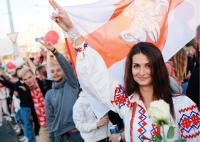
A Feminist Framework for Understanding of the Role of Women in the Belarusian Revolution: Domestic Violence, Care, and Sisterhood
For the anniversary of the Belarusian revolution, Belarusian poet Hanna Komar wrote the article “Sisterhood Behind Bars: Female Solidarity in Belarusian Prisons” for Eurozine, based on interviews with women who were political prisoners.
Politisches Delirium
Natürlich kann ein politisches Subjekt, insbesondere in der Position eines Souveräns, nicht wirklich mit einem gewöhnlichen Menschen verglichen werden, insbesondere nicht mit dessen mentaler Struktur. Aber bildlich gesprochen ist dieser Zustand des Rausches und der totalen Normverletzung in der Politik der Übergang in einen Ausnahmezustand. "Der Ausnahmezustand“, so Giorgio Agamben, “ist kein Chaos, das der Ordnung vorausgeht, sondern eine Situation, die aus der vorübergehenden Beendigung der Ordnung resultiert."
Political Delirium
The average person lives in a state of normalcy. This normalcy consists of daily habits, as well as moral and legal norms. These norms themselves constitute the social organism of the person. For the person, the normalcy of quotidian practices ensures a predictable lifestyle, allowing him or her to make contact with similar people – perhaps including family members, neighbors or even passersby on the street. All of this is supported through the sum total of conventional rules of engagement, which exists first and foremost within the sphere of the rational. Alfred Schütz writes extensively about this very phenomenon.
The Belarusian Awakening: Looking Back on 2020
August the 9th is the first anniversary of the 2020 presidential election in Belarus. For many Belarusians this is a natural moment to reflect and to look back. Many of the people I know have been posting memories on social networks, of what they were doing in the days prior to the Big Watershed. As it typically happens, many people might not have realized they were living through historic moments, but the August of 2020 changed Belarus forever.
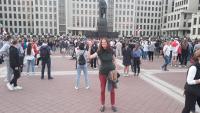
On the Way to a New Belarus: Critical Notes on the Emerging ‘Work on Mistakes’
In 1975, the famous Czech philosopher Jan Patočka released the book Heretical Essays in the Philosophy of History, which appeared in samizdat in Prague. Patočka was a founder of Charter 77 and one of its first signatories. He died in the year of Charter 77’s founding after a multi-hour police interrogation. In his book, Patočka defines history as a process of people rethinking and reconceptualizing the certainties of their collective lives.
Hijacking in Belarus and Elsewhere
The precedent set by a terror kidnapping, and what to do next
How to respond when it is the state that hijacks? On 23 May Belarusian authorities hijacked a Ryanair flight from Athens to Vilnius in order to abduct the journalist Roman Protasevich. Belarusian air traffic control falsely claimed that a bomb was on board, and a Belarusian fighter jet escorted the airliner to Minsk, which was not the closest airport. The Belarusian regime has published a trophy video, in which Protasevich, looking worn and beaten, confesses to everything in a flat tone and in legalistic phraseology.
The EU, the Lukashenka Regime in Belarus, and the Abduction of Raman Pratasevich
The Lukashenka Regime
Aliaksandr Lukashenka has ruled Belarus for 27 (!) years—with no end in sight. Of course, he could never have maintained the position of a leader for so long without massive political, economic, military, diplomatic and propaganda support from Russia. And there is no doubt that the hijacking of a Ryanair passenger airplane bound from Athens to Vilnius on May 23, 2021 for the purpose of arresting opposition journalist and blogger Raman Pratasevich would never have taken place without Russian consent (and possibly active support), even though public confirmation of this is lacking (and will likely never come). Many politicians, media, and other observers in the EU and North America expressed surprise at the impudent act of compelling a civilian aircraft to land in Minsk under threat of being shot down by a Belarusian Air Force MiG-29 fighter plane. But surprise is only possible if one knows nothing about Lukashenka's political career—and specifically the methods of exercising power he has employed since 1994.
The Hijack: Europe, Belarus, and the Abduction of Roman Protasevich
On 23 May, a Belarusian fighter plane intercepted Ryanair 4978 and forced the European commercial airliner to land in Minsk. The reporter Roman Protasevich (26), known for his coverage of pro-democracy protests, was then abducted by Belarusian authorities, along with the student Sofia Sapega (23). How can reporters be protected against the use of military force by dictators? And how should the EU react to the state hijacking of an aircraft bound from one EU capital to another? Given Russia’s dominant role in Belarus, might it bear responsibility?
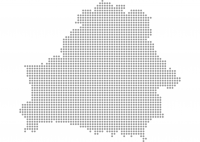
Terror vs. the Truth in Belarus
What the hijacking of a reporter means for us all
No matter how important you are, it is unlikely that a dictator has scrambled a fighter plane to force down a passenger flight so that he can arrest you. This just happened to the young Belarusian journalist Roman Protasevich. His flight from one city in the European Union to another, from Athens to Vilnius, was hijacked by the Belarusian state, forced to the ground by a false bomb warning and a MiG escort. Protasevich and his girlfriend Sofia Sapega were arrested at the Minsk airport. Sapega is a Russian citizen, Protasevich a Belarusian.
Belarus (5/5): Putin Chases Shadows
What Belarus could teach Russian leaders
Vladimir Putin is boxing with three shadows, one from the past, one from the future, and one from the present.
Belarus (4/5): The Next War?
Russian and Belarusian crises merge
Vladimir Putin's foreign policy is masterful until it is not. Russia is good at engineering situations that showcase the strengths of its leader, but poor at following a line of policy that would advance its national interests.
Belarus (3/5): Two fake coups...
And a real one
Within the last nine months, Belarusian authorities have announced that (1) Russia organized a coup d'état to overthrow President Alexander Lukashenko and (2) America organized a coup d'état to overthrow President Alexander Lukashenko.
Neither of these claims was true. If we can understand the evolution of the fiction, we can see the direction the country is going, and prepare ourselves for the dramatic events likely to follow this summer.
Belarus (2/5): Nation Next
Enforced memory is a tool of tyranny
Tell me what you remember, and I will tell you who you are. Tell me what you are allowed to remember, and I will tell you who rules you.
Belarus (1/5): The Worst War
To remember the Second World War is to remember Belarus
These are the days, the eighth and ninth of May, when we recall the end of the Second World War in Europe. Memory tends to shroud history, and those with the weaker voices are forgotten. Sometimes the lands that suffer most are least able to gather the attention of others.
On the Nature of Political Antagonism in Belarusian Society
Antagonism is an irreconcilable conflict between two parties caused by a radical contradiction in their positions (interests, principles, beliefs). The political field of Belarus was structured antagonistically already during the pre-election campaign, namely when Svetlana Tikhanovskaya, supported by Maria Kolesnikova and Veronika Tsepkalo, announced her one-item program: to hold the new fair elections. Against the background of the arrests of activists and two key candidates for participation in the elections (Sergei Tikhanovsky and Viktor Babaryko) as well as the refusal to register Valery Tsepkalo the brevity of Tikhanovskaya's program made clear that her crucial discrepancy with the then legitimate president consists in a completely opposite understanding of relation between law and power. Whereas Tikhanovskaya insisted on the principle of the rule of law Lukashenko hold to the a-la Schmittian principle of sovereign power according to which a sovereign (monarch) has the right to make extraordinary decisions not based on the law if he consider it necessary in the interests of the state's security.
The Heuristics and Poiesis of the Belarusian Revolution
Heuristics are utilized in the discovery of new things. The classical concept of poiesis is the creative making of something new. The former has to do with perceiving reality; the latter is concerned with transforming it. Experts from a variety of fields agree that the Belarusian Revolution is a historically unique phenomenon, fundamentally new in multiple ways.
Toward a Genealogy of the “Society of the Shocked”
The basic foundation of social cooperation in any society is what is known in Russian as zdravyi smysl [literally: sound sense, or good judgement]. In English this concept is referred to as “common sense.”
Painting "Imprisoned"
A calm silhouette against the background of the color of purity and peace. A person is peaceful, and yet the body is exhausted and severely beaten. Here, any anatomical or light-and-shadow analysis seems meaningless and impossible because this is not what catches the eye in such circumstances. In spite of it all, this person holds steady.
Unprotected – Неабароненая
A project by Hanna Komar (poems) and Urbanparadox (photos)
Original poems in Belarusian here
Description of the project below.
Philosopher Olga Shparaga detained in Belarus
UPDATE: Olga Shparaga was detained again on Friday, October 9, and summoned to the District Department of Internal Affairs (РУВД) for a “conversation.” On Monday, October 12, she was charged with 15 days of administrative arrest. On the same day, the Belarussian Ministry of the Interior has gone over to openly threaten to shoot at the protesters (cf. this article on the Russian service of BBC).
German Text below
October 5, 2020
Vitalij Portnikow: Wir werden niemals Brüder sein.
Erstveröffentlichung auf Grani.ru am 10. September 2020.
Übersetzung aus dem Russischen: Martin Malek
14.09.2020
Swetlana Alexijewitsch, Nobelpreisträgerin [für Literatur, Anm. d. Übers.] und das letzte in Freiheit verbliebene Mitglied des Präsidiums des Koordinierungsrates der belarussischen Opposition, wandte sich an die russische Intelligenzija – mit einem Appell voller Bitterkeit und Unverständnis: Warum unterstützen Sie nicht das stolze Volk eines kleinen Landes [d.h. Belarus], das sich gegen eine Diktatur aufgelehnt hat! Schließlich sind wir immer noch Eure Brüder!
Putin is a Student of Lukashenka’s: A Conversation Between Sławomir Sierakowski and Adam Michnik
Translated by David Kurkovskiy
August 21, 2020
Original interview in Polish, published by Krytyka Polityczna on August 12, 2020.
Whoever governs Belarus is fated to build relations with the Kremlin. And as long as the Kremlin remains as strong as it is, it is the Kremlin that will set the terms. At the same time, the situation will look different once something in Russia changes – says Adam Michnik in a conversation with Sławomir Sierakowski.
“Es geht jetzt um die demokratische Zukunft von Belarus”. Interview mit der Philosophin Olga Shparaga
19. August 2020
Olga Shparaga engagiert sich seit Jahren in herausragender Weise für die belarussische Zivilgesellschaft und die Reform von Bildung und Universitäten. Studiert hat sie u.a. in Bochum. Ihre Philosophie, beeinflusst von Phänomenologie und Post-Strukturalismus, verfolgt klar emanzipatorische Agenden.
In den Tagen des Protests ist sie an vielen Fronten aktiv. Trotzdem nahm sie ausführlich Stellung zu unseren Fragen, die wir am 15.8. per Email an sie übermittelt haben. Schon am nächsten Tag (So., 16.8.) antwortete sie:
“Ich habe begonnen zu schreiben! (…) Bald sammeln wir uns wieder in der Stadt! Heute ALLE!”
In ihrem Interview berichtet sie auch darüber, wie gerade die Proteste dieses Sonntags ihr Land wahrscheinlich für immer verändern werden.
Wie erlebst Du die gegenwärtige Situation: Überwiegt die Sorge und die Angst vor den gewaltsamen Verhaftungen der Polizei oder die Freude, dass in „der letzten Diktatur Europas“, wie man Belarus charakterisiert hat, etwas in Bewegung gekommen ist?
Jewgenij Kaljukow: Tichanowskaja kündigte den Beginn der Schaffung eines Rates zur Machtübergabe an
14.08.2020 on RBC
Russisches Original unter: https://www.rbc.ru/politics/14/08/2020/5f3684459a794768cfb3fecd
Übersetzung: Martin Malek
Sławomir Sierakowski: They Fired At Us With Polish Ammunition
August 11, 2020, Minsk
Monday evening’s peaceful protest in Minsk was scheduled for 7 pm on Victory Square, around the Minsk Hero City Obelisk. But police blocked off the square and the streets leading to it, so demonstrators could not gather there. In accordance with the opposition’s contingency plan, people instead gathered to protest around the city’s main metro stations.
Pavel Barkouski: Are You Serious, Mr. Professor? Belarus’ Philosophers Respond to Žižek
First published in Belarusian on Koinè.
Translated from Belarusian by Aliaksei Kazharski
For a short period of time, Belarus has become a top media event to the world. The event is less depressive than the coronavirus stories and more inspiring for supporters of democracy who have been lately given many reasons to be pessimistic by the rise of right-wing populism. This is why Belarus is subject of many discussions and statements. Even the famous spokesman of left-wing intellectuals Slavoj Žižek felt that he had to share his view on the events. Surprisingly, his take did not live up to his reputation. He demonstrated poor knowledge of the subject and a tendency to use a set of conceptual cliches.
Pavel Barkouski: Ist das Ihr Ernst, Herr Professor?
Erstveröffentlichung auf Koinè, 9. September 2020.
Übersetzung aus dem Belarussischen: Martin Malek
Für kurze Zeit wurde Belarus zu einem Top-Medienereignis für die ganze Welt. Es ist weniger deprimierend als die Nachrichten über das Coronavirus und inspirierender für Anhänger der Demokratie, die wegen dem florierenden Rechtspopulismus viel Grund für Pessimismus hatten. Aber jetzt ist es [Belarus, Anm. d. Übers.] ein Thema für viele Aussagen und Diskussionen. Sogar der bekannte Sprecher linker Intellektueller, Slavoj Žižek, musste seine Sicht der Ereignisse in Belarus formulieren. Das fiel aber, gemessen an seinem Ruf, überraschenderweise schwach aus. Davon zeugen schlechte Kenntnisse des Gegenstandes der Diskussion und die Verwendung bestimmter konzeptioneller Stereotypen.
Almira Ousmanova: Belarus 2020: Time for #evalution
The 2020 presidential election campaign in Belarus was a dramatic one. Aliaksandr Lukashenka, known as “Europe’s last dictator”, has been in power since 1994 and planned to be re-elected for the sixth time. Yet this year he has found himself faced with a lack of support from the majority of the population and a deep crisis of legitimacy.
Nataliya Gumenyuk: Why weak points of Belarus state may play in favour of the protests
Protests in Belarus are one of the most beautiful and genuine I’ve ever seen. The paradox of Belarus protests is that everything we believe to be the weak point of Belarus society may favor protestors. Intuitively people follow all the rules of non-violent resistance: avoiding confrontation – to strengthen moral authority for mass mobilization so more people join, and authorities defect. And yes, risks are very high, as the regime can be brutal. Incredible is that protests are also going against the authoritarian curve/trend we see globally and avoid traps which usually may weaken the movement.
Tatiana Aleshka: For all those who are interested in events in Belarus, and for all those who are asking what is happening here.
Original post by Tatiana Aleshka in Russian, August 15, 2020
Translated by Markian Dobczansky
For all those who are interested in events in Belarus, and for all those who are asking what is happening here.
Volha Biziukova “I was an Election Observer”
August 18, 2020
On the 29th of July, I entered an elegant 19th-century mansion in Hütteldorf, the neighborhood in Vienna where the Belarusian embassy is located. For the next two weeks, its ornate main hall would become voting station #75. I handed in my application to become an election observer, but the election commission members, all embassy employees, did not know how to proceed; they looked lost. It seemed that I was the first independent election observer they had encountered.
The Head of the Central Election Commission of Belarus: “Tikhanovskaya’s address was recorded in my cabinet”
Lidiya Ermoshina, the Head of the Central Election Commission of Belarus [TsIK], confirmed that presidential candidate Svetlana Tikhanovskaya’s address, in which she reads, from a piece of paper, a call to stop the street protests, was recorded in her cabinet in the presence of two high ranking law enforcement officers.
Angela Espinosa Ruiz: An Ode to the Victims of the OMON* and Violence in General
Translated by David Kurkovskiy and Zachary Nelson
Andrey Vozyanov: Can’t find the words to explain how dreadful is the ongoing in Belarus
Several hundreds of relatives gather near IVS temporary holding facility in Minsk and try, without success, to know where should they bring parcels for their children.
Ingo Petz: Ein gewaltfreier Protest getragen vom Zorn der Frauen, Mütter und Großmütter
In Belarus halten unvermindert die Proteste gegen die manipulierten Wahlen vom 9. August an. Seit dem 11.8. begleitet das IWM die aktuellen Entwicklungen mit dem „Chronicle from Belarus“. Heute, am 14.8., erfolgte überraschenderweise die Freilassung hunderter Inhaftierter, die von Folterungen berichten. Eine erste Einschätzung dieses Manövers liefert Ingo Petz, der als Journalist seit mehr als zwei Jahrzehnten mit dem Land vertraut ist. Im Jahr 2017 arbeitete Petz am IWM an seinem Buchprojekt „Belarus—My Life and Travels in an Unknown Country in Europe.“
Eine ganz wichtige Rolle für die Entwicklungen in Belarus könnte die EU spielen, die sich aber – wie schon im Fall der Ukraine – abwartend verhält. Gerade aus Deutschland, das gegenwärtig die EU-Ratspräsidentschaft innehat, wäre eine deutliche Stellungnahme nötig. Neben den Berichten und Interviews auf Englisch sowie den Links zu polnischen und ukrainischen Quellen sollen in diesem Blog deshalb verstärkt auch deutschsprachige Artikel/Interviews publiziert werden.
–Ludger Hagedorn
Sławomir Sierakowski: Report on the Events of August 9, 2020 in Minsk, Belarus
The Belarusian opposition has adopted three principles of protest: first, it is to be absolutely peaceful; second, it is to be long-lasting—that is, it will continue until it succeeds; and finally, it is intended to be self-limiting in a political sense. Supporters of opposition candidate Sviatlana Tsikhanouskaya have three specific goals: free elections, ending repression, and restoring the previous, democratic constitution. This approach, this explicit self-limitation, makes the process very clear to the public, very motivating, and evidently effective in the sense that people are going out into the streets of cities large and small in unprecedented numbers. In Minsk we have seen crowds of 60,000-70,000; in smaller towns, protests have numbered up to 20,000.
Natalia Gumenyuk: On the Barricades, Under Fire from Stun Grenades, and With No Internet. A Special Report from Minsk on the Elections in Belarus
10 August 2020
Translated from Ukrainian by Katherine Younger
It took stun grenades, water cannons, barricades and street blockades, but ultimately – after several hours of street confrontations, already late into the night – the Belarusian OMON special police forcefully dispersed the thousands of Minsk residents who took to the streets, not believing the official declaration of Aliaksandr Lukashenka’s victory in the presidential elections. Thus ended election day in Minsk, which started out reminiscent of a holiday. Opposition candidate Sviatlana Tsikhanouskaya was greeted at her precinct with applause. And despite widespread violations during previous elections, there were hopes that this sixth presidential election would be different. Suspilne’s correspondent was in Belarus to track events.
Aliaksandr Bystryk: “Lukashenka is the abusive husband who beats his wife when she wants to leave. . .”
Aliaksandr Bystryk reports in an interview with IWM Visiting Fellow Marci Shore about the situation in Belarus.
Chronicle from Belarus: An Introduction
Presidential elections have long been merely pro forma in post-Soviet Belarus, where Alexander Lukashenko has been ruling as a dictator for more than a quarter-century. In May 2020 he imprisoned Sergei Tikhanovskii - an oppositionist YouTube blogger - immediately following Tikhanovskii’s announcement that he intended to run against Lukashenko in the presidential elections. In July Tikhanovskii’s wife, Svetlana Tikhanovskaia - an English teacher and the mother of their two young children - announced that she would run in Sergei’s place.
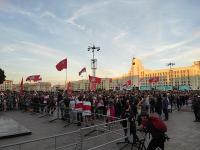
Understanding Belarus: Suggested Background Reading
Texts chosen to give a brief overview and introduction to the evolving situation in Belarus.
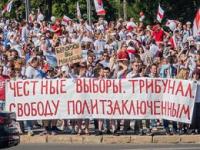
Selection of Interviews
The long-form interview - a kind of narrative conversation - has long played a special role in the literature and history of East and Central Europe. What follows are a selection of interviews, including some conducted by IWM specifically for the Chronicle, which provide a dialogical perspective on events as they unfold.
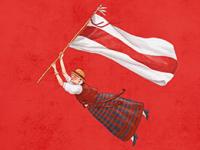
Women in White: Gendered Dimensions of the Belarusian Protests
On 13 August 2020, following three days of terror, when it seemed that all might have been lost, tens of thousands of women, dressed in white and carrying flowers, came out onto the streets. They have come out continually since then, rejecting violence and demanding accountability. A fearless seventy-three-year-old woman, the diminutive, white-haired Nina Baginskaya, has become the emblematic figure of a feminist revolution of a new kind.
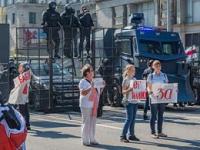
Selection of Reports
Sławomir Sierakowski, from Warsaw, and Nataliya Gumenyuk, from Kyiv, were among the very few foreign journalists present in Belarus in August 2020. We include their reporting from the ground as well as documentation by other observers and journalists, including IWM Visiting Fellow Volha Biziukova, who wrote about her experience as an election observer at the Belarusian embassy in Vienna.
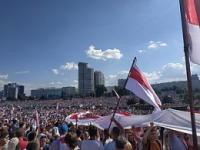
Selection of Videos
A curated archive of videos that document the ongoing crisis in Belarus.
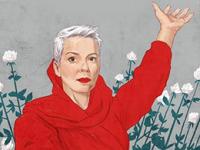
Arts and Protests
Visual artists have played a large role as both participants in and as documenters of the protest movement. Yana Chernova’s “Belarusian Venus” - an oil painting depicting a female nude bruised from beatings - has become the iconic image of a dictator’s brutality.
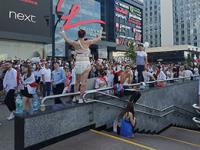
Poetry & Music
Maria Kalesnikova, who remains in Belarusian prison, is herself is a flautist and conductor. Poets and musicians from Belarus have responded to the revolutionary events with their own compositions; poets and musicians from abroad have responded with performances in solidarity with their Belarusian colleagues.
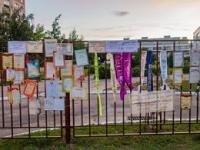
Open Letters
A curated archive of open letters that have been published during the Belarusian crisis.

Witness and Participant Testimonies
Since the beginning of protests, Belarusian activists have managed to organize a very effective society and have create a range of tools and services which help people to organize themselves in communities, write governmental complaints, be aware of their own rights and more.
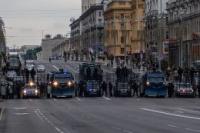
Siloviki: Violence, Unmasking, and Lukashenko’s Security Forces
Belarus's “Siloviki” or “men of force” - a term referring to members of the security services - have enabled Lukashenko to remain in power. They have responded to the protests by detaining, beating and torturing nonviolent protestors.
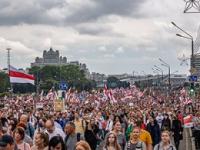
Selection of Essays and Opinions
Novelists, philosophers, columnists, publicists and political analysts - both in Belarus and abroad - have expressed their own emotions and offered their own analyses of the Belarussian situation. Included here are essays by Olga Tokarchuk, Volodymyr Rafeenko, Vitaliy Portinkov, Katja Petrowskaja, Olga Shparaga, Masha Gessen and many others.

Speeches by Svetlana Tikhanovskaya
Tikhanovskaya speeches that have appeared in different Media: